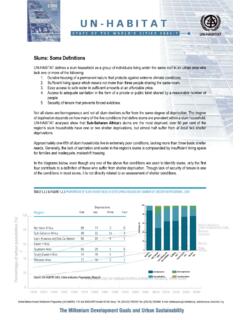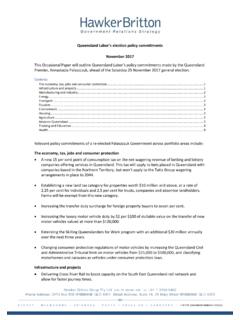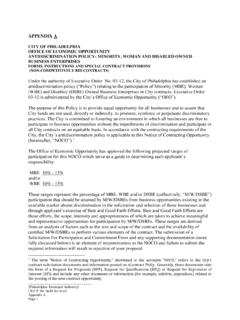Transcription of The Habitat Agenda Goals and Principles, …
1 The Habitat Agenda Goals and principles , commitments and the global Plan of ActionThe Habitat Agenda Goals and principles , commitments and the global Plan of Action Chapter I - Preamble 1. We recognize the imperative need to improve the quality of human settlements, which profoundly affects the daily lives and well-being of our peoples. There is a sense of great opportunity and hope that a new world can be built, in which economic development, social development and environmental protection as interdependent and mutually reinforcing components of sustainable development can be realized through solidarity and cooperation within and between countries and through effective partnerships at all levels.
2 International cooperation and universal solidarity, guided by the purposes and principles of the Charter of the United Nations, and in a spirit of partnership, are crucial to improving the quality of life of the peoples of the world. 2. The purpose of the second United Nations Conference on Human Settlements ( Habitat II) is to address two themes of equal global importance: "Adequate shelter for all" and "Sustainable human settlements development in an urbanizing world". Human beings are at the centre of concerns for sustainable development, including adequate shelter for all and sustainable human settlements, and they are entitled to a healthy and productive life in harmony with nature.
3 3. As to the first theme, a large segment of the world's population lacks shelter and sanitation, particularly in developing countries. We recognize that access to safe and healthy shelter and basic services is essential to a person's physical, psychological, social and economic well-being and should be a fundamental part of our urgent actions for the more than one billion people without decent living conditions. Our objective is to achieve adequate shelter for all, especially the deprived urban and rural poor, through an enabling approach to the development and improvement of shelter that is environmentally sound.
4 4. As to the second theme, sustainable development of human settlements combines economic development, social development and environmental protection, with full respect for all human rights and fundamental freedoms, including the right to development, and offers a means of achieving a world of greater stability and peace, built on ethical and spiritual vision. Democracy, respect for human rights, transparent, representative and accountable government and administration in all sectors of society, as well as effective participation by civil society, are indispensable foundations for the realization of (1 of 109)11/13/2003 12:50:09 PMThe Habitat Agenda Goals and principles , commitments and the global Plan of Actionsustainable development.
5 The lack of development and the existence of widespread absolute poverty can inhibit the full and effective enjoyment of human rights and undermine fragile democracy and popular participation. Neither of them, however, can be invoked to justify violations of human rights and fundamental freedoms. 5. Recognizing the global nature of these issues, the international community, in convening Habitat II, has decided that a concerted global approach could greatly enhance progress towards achieving these Goals . Unsustainable patterns of production and consumption, particularly in industrialized countries, environmental degradation, demographic changes, widespread and persistent poverty, and social and economic inequality can have local, cross-national and global impacts.
6 The sooner communities, local governments and partnerships among the public, private and community sectors join efforts to create comprehensive, bold and innovative strategies for shelter and human settlements, the better the prospects will be for the safety, health and well-being of people and the brighter the outlook for solutions to global environment and social problems. 6. Having considered the experience since the first United Nations Conference on Human Settlements, held at Vancouver, Canada, in 1976, Habitat II reaffirms the results from relevant recent world conferences and has developed them into an Agenda for human settlements: the Habitat Agenda .
7 The United Nations Conference on Environment and Development - the Earth Summit - held at Rio de Janeiro, Brazil, in 1992, produced Agenda 21. At that Conference, the international community agreed on a framework for the sustainable development of human settlements. Each of the other conferences, including the Fourth World Conference on Women (Beijing, 1995), World Summit for Social Development (Copenhagen, 1995), the International Conference on Population and Development (Cairo, 1994), the global Conference on the Sustainable Development of Small Island Developing States (Barbados, 1994), the World Conference on Natural Disaster Reduction (Yokohama, 1994) and the World Conference on Human Rights (Vienna, 1993), as well as the World Summit for Children (New York, 1990)
8 And the World Conference on Education for All (Jomtien, Thailand, 1990), also addressed important social, economic and environmental issues, including components of the sustainable development Agenda , for which successful implementation requires action at the local, national and international levels. The global Strategy for Shelter to the Year 2000, adopted in 1988, which emphasizes the need for improved production and delivery of shelter, revised national housing policies and an enabling strategy, offers useful guidelines for the realization of adequate shelter for all in the next century.
9 7. During the course of history, urbanization has been associated with economic and social progress, the promotion of literacy and education, the improvement of the general state of health, greater access to social services, and cultural, political and religious participation. Democratization has enhanced such access and meaningful participation and involvement for civil society actors, for publicprivate partnerships, and for decentralized, participatory planning and management, which are important features of a successful urban future.
10 Cities and towns have been engines of growth and incubators of civilization and have facilitated the evolution of knowledge, culture and tradition, as well as of industry and commerce. Urban settlements, properly planned and managed, hold the promise for human development and the protection of the world's natural resources through their ability to support large (2 of 109)11/13/2003 12:50:09 PMThe Habitat Agenda Goals and principles , commitments and the global Plan of Actionnumbers of people while limiting their impact on the natural environment.








